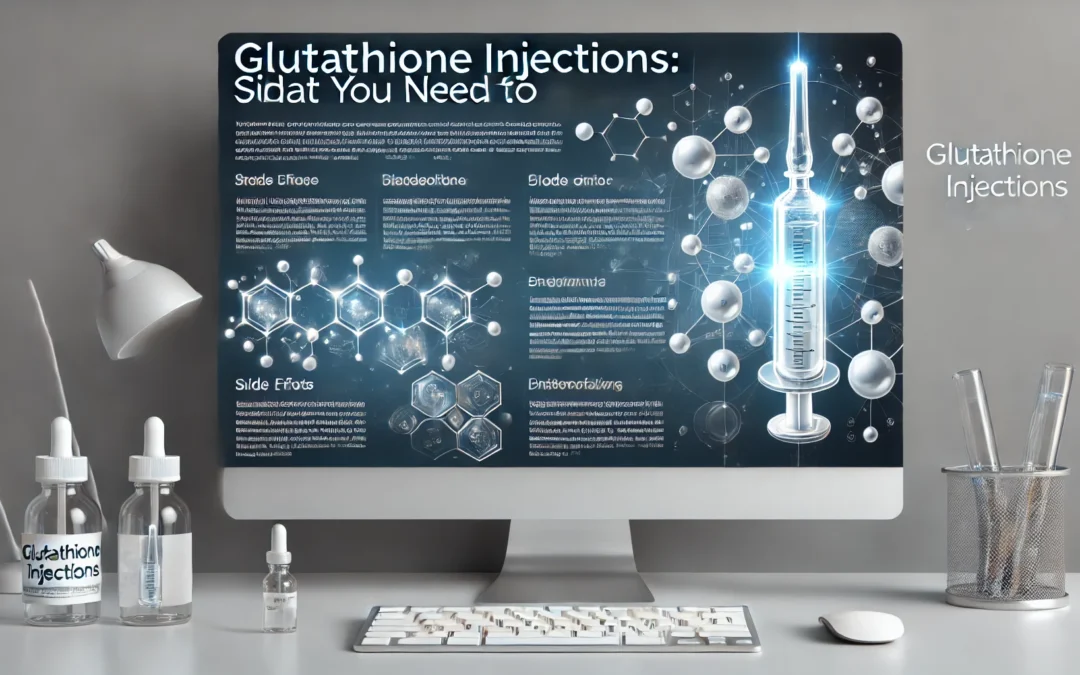Glutathione injections have become quite popular due to their potential health and cosmetic benefits. They are widely used for skin lightening, detoxification, and improving general well-being. However, it’s important to know that glutathione injections side effects can occur, just like any other treatment. In this article, we’ll explore the most common and serious side effects of glutathione injections. We’ll also provide tips on how to reduce risks and stay safe.
What Are Glutathione Injections?
Before diving into the glutathione injections side effects, it’s important to understand what these injections are and why people use them. Glutathione is a powerful antioxidant naturally found in the body. It helps protect cells from damage, supports the immune system, and detoxifies the liver. When given through an injection, glutathione is absorbed directly into the bloodstream, providing faster and more effective results compared to oral supplements.
People typically choose glutathione injections to improve skin tone, lighten pigmentation, treat acne scars, and even slow signs of aging. Others use it for boosting energy levels and supporting general wellness.
Also Read: How Much Glutathione Should You Inject? Dosage & Frequency
Common Glutathione Injections Side Effects
While glutathione injections are effective for many, they do come with side effects. Some side effects are mild, while others can be more serious. Here are the most commonly reported glutathione injections side effects:
1. Skin Reactions
Skin reactions are one of the most frequent side effects. These can include:
- Redness at the injection site
- Itching or rash
- Swelling or tenderness
Fortunately, these reactions are typically mild and subside within a few hours or days. However, if the reaction worsens or doesn’t go away, it’s important to consult a healthcare professional.
2. Allergic Reactions
Though rare, some people may experience allergic reactions. Symptoms to watch out for include:
- Difficulty breathing
- Swelling of the face, lips, or throat
- Dizziness or fainting
- Hives or intense itching
If you experience any of these symptoms, get medical help immediately. Severe allergic reactions can be life-threatening, so it’s crucial to inform your doctor of any known allergies before starting glutathione injections.
3. Digestive Issues
Glutathione injections can cause digestive problems in some individuals, although this is more common with oral supplements. Symptoms may include:
- Nausea
- Vomiting
- Stomach cramps or bloating
These side effects are usually temporary and will go away once the body adjusts. However, if they persist, seek advice from your healthcare provider.
4. Headaches and Dizziness
Headaches and dizziness are also common. These may occur as your body adjusts to the increased glutathione levels. Dehydration can make these symptoms worse, so it’s important to drink plenty of water before and after your injection.
If headaches or dizziness become frequent or severe, let your doctor know so they can help you manage these symptoms.
5. Risk of Infection
Since injections involve needles, there is always a risk of infection at the injection site. Signs of infection include:
- Redness, warmth, or pus at the site
- Fever or chills
- Persistent pain
If you notice any of these symptoms, it’s important to contact your healthcare provider right away to prevent further complications.
Serious Glutathione Injections Side Effects
Most glutathione injections side effects are mild and temporary. However, there are some rare but serious risks to be aware of, including:
1. Kidney Damage
One of the more serious side effects of glutathione injections is kidney damage. This risk is higher if you have pre-existing kidney conditions or if you receive high doses of glutathione over a long period. If you have kidney issues, talk to your doctor before starting treatment to weigh the risks.
2. Skin Discoloration
While glutathione injections are often used for skin lightening, prolonged use can sometimes cause uneven skin tones or hypopigmentation (light spots). To minimize the risk of skin discoloration, follow the recommended dosage and frequency advised by your healthcare provider.
3. Respiratory Problems
In very rare cases, glutathione injections can cause respiratory issues such as shortness of breath or chest tightness. If you experience these symptoms, seek medical attention immediately.
How to Minimize the Risk of Side Effects
While glutathione injections side effects can occur, there are ways to reduce the risks:
1. Choose a Qualified Provider
Ensure that you get your glutathione injections from a licensed and experienced healthcare provider. A professional will use the proper techniques to minimize risks, including infection and complications.
2. Follow the Recommended Dosage
It’s important to stick to the prescribed dosage and frequency. Taking more than the recommended amount of glutathione can increase the risk of more serious side effects.
3. Stay Hydrated
Drinking enough water before and after your injection can help reduce headaches, dizziness, and digestive issues, which are common glutathione injections side effects.
4. Monitor for Side Effects
Keep track of any side effects after your injection. If you notice any unusual or severe symptoms, contact your healthcare provider right away.
Conclusion
Glutathione injections can be effective for improving skin tone, detoxifying the body, and supporting overall wellness. However, it’s important to be aware of the glutathione injections side effects, which can range from mild to more serious risks.
To minimize these side effects, make sure you receive your injections from a qualified healthcare provider, follow the recommended dosage, and stay hydrated. Always consult with your doctor before starting any treatment, especially if you have pre-existing health conditions.
By being informed about the potential risks, you can make a safer and more confident decision about whether glutathione injections are the right choice for you. If you experience concerning symptoms after your treatment, seek medical help immediately.


